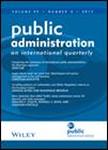-
作者:De Montricher, N
作者单位:Universite PSL; Ecole Normale Superieure (ENS); Centre National de la Recherche Scientifique (CNRS)
摘要:The article intends to explain why although tremendous changes have occurred in the structure of government - especially the laws organizing decentralization since 1982 - the institution of the Prefect is still alive in the year 2000. Created in 1800, the institution of the Prefect derives from the will of the central authority to rely on its own representatives to ensure that public policies will be equally implemented over the whole territory. This objective remains but it has to be combined...
-
作者:Bate, P
作者单位:University of Birmingham
摘要:This article is a case study of a large-scale change programme within an NHS hospital. Drawing upon ethnographic data collected over a two-year period of intensive research involvement, it tells how the hospital struggled to transform itself from a rigid and divided 'hierarchy' into a more flexible and collaborative 'networked community.' The paper describes the model of change devised for this purpose, and seeks to capture the lessons learned on the rocky road to network organizing. It conclu...
-
作者:Considine, M
作者单位:University of Melbourne
摘要:Contemporary debates concerning the nature of 'new governance' typically focus upon the shifting roles played by bureaucracies, networks and markets in the provision of public services (Kooiman 1993; Ormsby 1988). At the core of these recent changes we find a strong interest in having private agents deliver public services. Sometimes this is expressed as privatization and in other cases a 'mixed economy' of public and private participation may be devised (Williamson 1975; Moe 1984). In this st...
-
作者:Greer, A; Hoggett, P
作者单位:University of West England
摘要:This paper draws on recent research conducted by the authors to examine the nature of board/executive relations in three different kinds of Local Public Spending Body (LPSB). Big variations are noted, between and within sectors, in the way in which boards organize themselves and the degree of power they have in relation to executives. In all organizations studied the executive played a crucial role both in managing day-to-day operations and in setting the organization's strategic direction. Ch...


